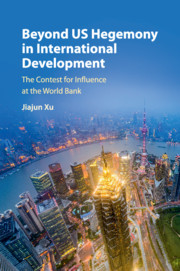Description
Beyond US Hegemony in International Development
The Contest for Influence at the World Bank
Author: Xu Jiajun
This book provides essential background on China's bid for increasing influence over the US hegemonic architecture of international financial institutions.
Language: English
Subject for Beyond US Hegemony in International Development:
Approximative price 34.17 €
In Print (Delivery period: 14 days).
Add to cart
Beyond US Hegemony in International Development
Publication date: 12-2019
Support: Print on demand
Publication date: 12-2019
Support: Print on demand
Approximative price 83.99 €
In Print (Delivery period: 14 days).
Add to cart
Beyond US Hegemony in International Development
Publication date: 11-2016
Support: Print on demand
Publication date: 11-2016
Support: Print on demand
Description
/li>Contents
/li>Biography
/li>
China's initiative to establish the Asian Infrastructure Investment Bank (AIIB), attracting membership from G7 countries against the vocal opposition of the United States, has been recognised as a significant moment in an ongoing hegemonic transition. This book examines how power transitions have played out in the World Bank over the last five decades, offering the first authentic account of the international diplomacy behind donor financing of the World Bank's International Development Association (IDA). Jiajun Xu decodes how the United States amplified its influence at the World Bank despite its flagging financial contributions to IDA. She further demonstrates that the widening influence-to-contribution disparity provoked other donors into taking 'exit/voice' measures, contesting the hegemon's legitimacy. A rising China initially decided to become an IDA donor, seeking influence from within. However, the entrenched hegemonic position of the United States in World Bank governance drove China to initiate the AIIB and New Development Bank, putting competitive pressures on the US-centred multilateral institutions to adapt.
Introduction; 1. IDA burden-sharing: the unresolved puzzle; 2. Three power plays behind the politics of IDA burden-sharing; 3. IDA in the 1960s: hegemonic leadership amid bipolar geopolitics; 4. IDA in the 1970s: a turbulent era with accelerated burden-shifting; 5. IDA in the 1980s: the rise and retreat of the 'Reagan revolution'; 6. IDA in the 1990s: the struggle for power and fairness in a unipolar world; 7. IDA in the new millennium: leadership in transition?; 8. China's ascendancy: influence from within and impact from outside; Conclusion; Bibliography.
Jiajun Xu is the co-founder (together with Professor Justin Yifu Lin) and Executive Deputy Director of the Centre for New Structural Economics at Peking University, Beijing. Xu worked as a Junior Research Specialist at the United Nations' High Level Panel Secretariat on the Post-2015 Development Agenda responsible for the research on development financing and South–South Cooperation. She also worked as an international consultant on debt sustainability in the World Bank and productive capacity building for least-developed countries at the UNDESA Committee for Development Policy Secretariat. Xu holds a D.Phil. (Ph.D.) from the University of Oxford.
© 2024 LAVOISIER S.A.S.

